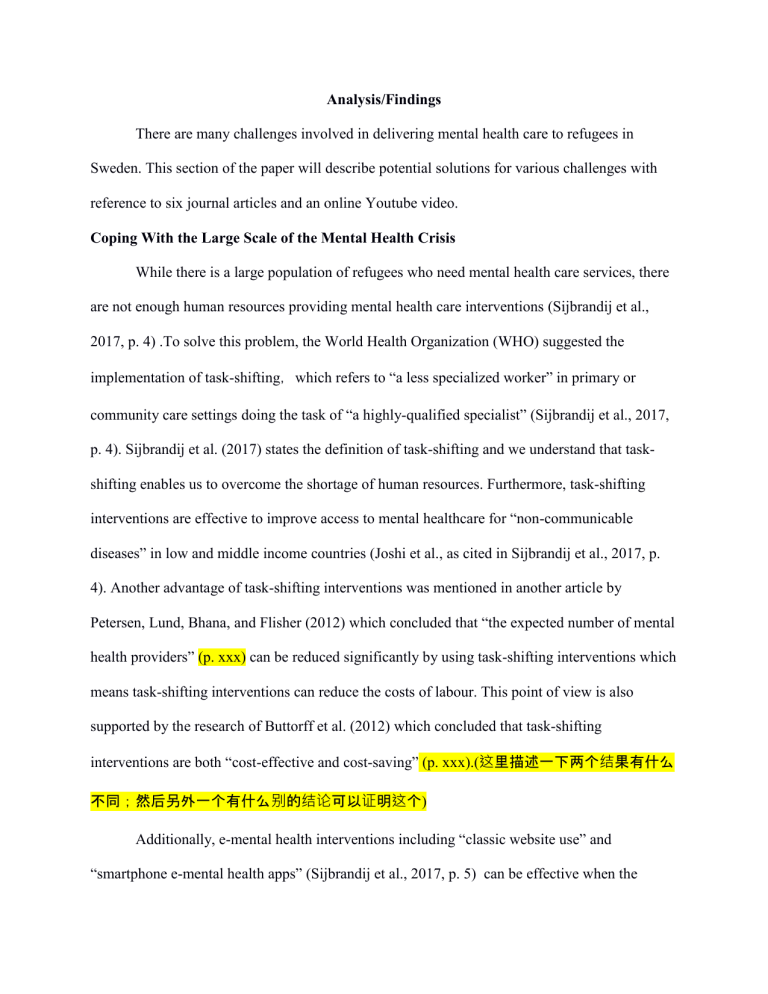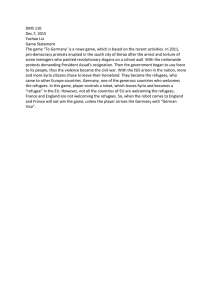
Analysis/Findings There are many challenges involved in delivering mental health care to refugees in Sweden. This section of the paper will describe potential solutions for various challenges with reference to six journal articles and an online Youtube video. Coping With the Large Scale of the Mental Health Crisis While there is a large population of refugees who need mental health care services, there are not enough human resources providing mental health care interventions (Sijbrandij et al., 2017, p. 4) .To solve this problem, the World Health Organization (WHO) suggested the implementation of task-shifting,which refers to “a less specialized worker” in primary or community care settings doing the task of “a highly-qualified specialist” (Sijbrandij et al., 2017, p. 4). Sijbrandij et al. (2017) states the definition of task-shifting and we understand that taskshifting enables us to overcome the shortage of human resources. Furthermore, task-shifting interventions are effective to improve access to mental healthcare for “non-communicable diseases” in low and middle income countries (Joshi et al., as cited in Sijbrandij et al., 2017, p. 4). Another advantage of task-shifting interventions was mentioned in another article by Petersen, Lund, Bhana, and Flisher (2012) which concluded that “the expected number of mental health providers” (p. xxx) can be reduced significantly by using task-shifting interventions which means task-shifting interventions can reduce the costs of labour. This point of view is also supported by the research of Buttorff et al. (2012) which concluded that task-shifting interventions are both “cost-effective and cost-saving” (p. xxx).(这里描述一下两个结果有什么 不同;然后另外一个有什么别的结论可以证明这个) Additionally, e-mental health interventions including “classic website use” and “smartphone e-mental health apps” (Sijbrandij et al., 2017, p. 5) can be effective when the refugees don’t “have access to mental health treatment due to internal (e.g. fear of stigmatization) or external (e.g. infrastructure) barriers” (Sijbrandij et al., 2017, p. 5). This means there are institutions that offer mental health care services but some refugees don’t come to get mental health care because they don’t want to be regarded as having mental illnesses or they don’t know about the existence of mental health institutions due to the lack of information. In such situations, smartphone e-mental health apps and classic website use can protect their privacy and refugees can get information about health care online. Furthermore, professionals can provide mental health services to more refugees due to “the relative brevity of e-mental health interventions and the possibility to automatize parts of the treatment” (Sijbrandij et al., 2017, p. 5) which means the process can save a lot of time by providing clear information and reducing time-consuming steps; therefore, more refugees can get services within a particular time and this overcomes the weakness of limited human resources in Sweden. The explanations and evidence above clearly suggest that e-mental health interventions can be effective solutions for mental health problems of refugees in Sweden. Cultural Differences Between Refugees and Health Care Providers (这一段最好加入一些 其它人的观点,然后把这个researcher的观点删除一部分。) Bäärnhielm and Mösko (2012) point out that cross-cultural training can help mental health professionals to improve their knowledge, skills, cultural awareness and cultural sensitivity so that they may be more familiar with the ways of thinking of refugees and understand the cause of their mental health problems, and therefore this can help the treatment process and solve mental problems more effectively. Bäärnhielm and Mösko (2012) found that cross-cultural training can change health professionals’ attitudes towards refugees and improve their ability to treat refugees, while refugees are more satisfied and happy to communicate with mental health providers who know their culture and speak their language. Overall, this article suggests the importance of cross-cultural training as it can overcome several inevitable difficulties including “language barriers”, “cultural(ly?) diverse health belief models” and “negative feelings on behalf of the staff in encounters with foreign patients in mental health care institutions” (Bäärnhielm & Mösko, 2012, p. S70), and the positive effects of cross-cultural training on both mental health providers and refugees are clear. Another article by Bhui, Warfa, Edonya, McKenzie, and Bhugra (2007) noted that cultural sensitivity and cultural awareness is required for mental health professionals when they treat patients from different countries. However, these two studies lack evidence that can prove the effects of cross-cultural training. Therefore I found another research study by Agic, Tuck, and McKenzie (2016) which concluded that there is strong evidence that culturally sensitive interventions are usually successful. Day Courses for Trainers and Ex.materials(?) for Training Others The Youtube video talks about what the government did to solve mental health problems of refugees in Sweden. The government offered 14 different day courses to 1000 participants in total. The courses contain topics such as “basic knowledge about trauma”, “migration and mental health – for primary care”, “migration and mental health – basic knowledge” etc. Most participants are from counties or municipalities that .... After taking these courses, these participants will be given Ex,materials such as manuals and presentation materials (slides, movies), so when they go back to their counties or municipalities, these participants will become trainers who can use these materials to train other refugees (Are the participants refugees themselves?). According to the video, “55% of participants are explicitly committed to training others”. Therefore, this is strong evidence that the courses can be an effective solution for mental health problems of refugees in Sweden. In addition, this method can also solve the problem of lack of human resources (Sijbrandij et al., 2017, p. 4) as mentioned above in the section “Coping With the Large Scale of the Mental Health Crisis” which is a suitable solution for Sweden to use to solve mental health problems of refugees. Early Interventions The MSF NGO has its own model of intervention which states that early mental health interventions can prevent the mental illnesses of refugees from becoming more serious (cite).The organization provides resources to refugees and lets refugees learn more about mental disorders in order to improve the mental health care of refugees in Sweden (cite). Conclusion Overall, the solutions for mental health problems of refugees in Sweden consist of taskshifting interventions, e-mental health interventions including “classic website use” and “smartphone e-mental health apps” (Sijbrandij et al., 2017, p. 5) , cross-cultural training and courses for trainers providing Ex.materials which allow them to train others. (Don’t use point form below.) -I recommend the Swedish government set up more task-shifting interventions and e-mental health interventions since they can make more efficient use of the limited mental health resources. Cross-cultural training is also essential because cultural sensitivity and cultural awareness is quite important. -The limitations of the research is that the resources used are all written in English, so maybe researchers should investigate some peer-review articles or online articles written in Swedish which are most likely to contain more useful information about solutions for mental health problems in Sweden. (不对、不是这样的) -In addition, we have not discussed whether these solutions are more effective than typical health care such as psychological therapy including cognitive behavioral therapy (CBT) , narrative exposure therapy (NET) and medication. Maybe the government should spend more money on these typical health care services. Therefore, for future research studies, we should investigate what solutions are the most effective for the mental health problems of refugees in Sweden. (应 该采用一些不同的办法。) References s Bäärnhielm, S., & Mösko, M. (2012). Cross-cultural training in mental health care – Challenges and experiences from Sweden and Germany. European Psychiatry, 27, S70-S75. doi:10.1016/S0924-9338(12)75711-5 Bhui, K., Warfa, N., Edonya, P., McKenzie, K., & Bhugra, D. (2007). Cultural competence in mental health care: A review of model evaluations. BMC Health Services Research, 7(1), 15-15. doi:10.1186/1472-6963-7-15 Blight, K. J., Ekblad, S., Persson, J., Ekberg, J., Växjö universitet, Ekonomihögskolan, E., & Fakulteten för humaniora och samhällsvetenskap. (2006). Mental health, employment and gender: Cross-sectional evidence in a sample of refugees from Bosnia-Herzegovina living in two Swedish regions. Social Science & Medicine, 62(7), 1697-1709. doi:10.1016/j.socscimed.2005.08.019 Buttorff, C., Hock, R. S., Weiss, H. A., Naik, S., Araya, R., Kirkwood, B. R., . . . Patel, V. (2012). Economic evaluation of a task-shifting intervention for common mental disorders in India. Bulletin of the World Health Organization, 90(11), 813. Hollander, A., Bruce, D., Burström, B., & Ekblad, S. (2011). Gender-related mental health differences between refugees and non-refugee immigrants--A cross-sectional register-based study. BMC Public Health, 11(1), 180-180. doi:10.1186/1471-2458-11-180 Hollander, A., Dal, H., Lewis, G., Magnusson, C., Kirkbride, J. B., & Dalman, C. (2016). Refugee migration and risk of schizophrenia and other non-affective psychoses: Cohort study of 1.3 million people in Sweden. BMJ, 352, i1030. doi:10.1136/bmj.i1030 Lindencrona, F., Ekblad, S., Hauff, E., Stockholms universitet, Samhällsvetenskapliga fakulteten, & Stressforskningsinstitutet. (2008). Mental health of recently resettled refugees from the Middle East in Sweden: The impact of pre-resettlement trauma, resettlement stress and capacity to handle stress. Social Psychiatry and Psychiatric Epidemiology, 43(2), 121-131. doi:10.1007/s00127-007-0280-2 Petersen, I., Lund, C., Bhana, A., Flisher, A. J., Mental Health and Poverty Research Programme Consortium, & the Mental Health and Poverty Research Programme Consortium. (2012). A task shifting approach to primary mental health care for adults in South Africa: Human resource requirements and costs for rural settings. Health Policy and Planning, 27(1), 42-51. doi: Sidorchuk, A., Engström, K., Johnson, C. M., Kayser Leeoza, N., & Möller, J. (2017). Employment status and psychological distress in a population-based cross-sectional study in Sweden: The impact of migration. BMJ Open, 7(4), 1-12. doi:10.1136/bmjopen-2016-014698 Sijbrandij, M., Acarturk, C., Bird, M., Bryant, R. A., Burchert, S., Carswell, K., . . . Cuijpers, P. (2017). Strengthening mental health care systems for Syrian refugees in Europe and the Middle East: Integrating scalable psychological interventions in eight countries. European Journal of Psychotraumatology, 8, 1-11. doi:10.1080/20008198.2017.1388102 Swedish Association of Local Authorities and Regions (2017). Improving mental health for asylum seekers and newcomers in Sweden. Retrieved from https://www.youtube.com/watch?v=l22KD-MbTdg&t=355s Tinghög, P., Malm, A., Arwidson, C., Sigvardsdotter, E., Lundin, A., Saboonchi, F., . . . Hälsovetenskapliga institutionen. (2017). Prevalence of mental ill health, traumas and postmigration stress among refugees from Syria resettled in Sweden after 2011: A populationbased survey. BMJ Open, 7(12), x-x.


